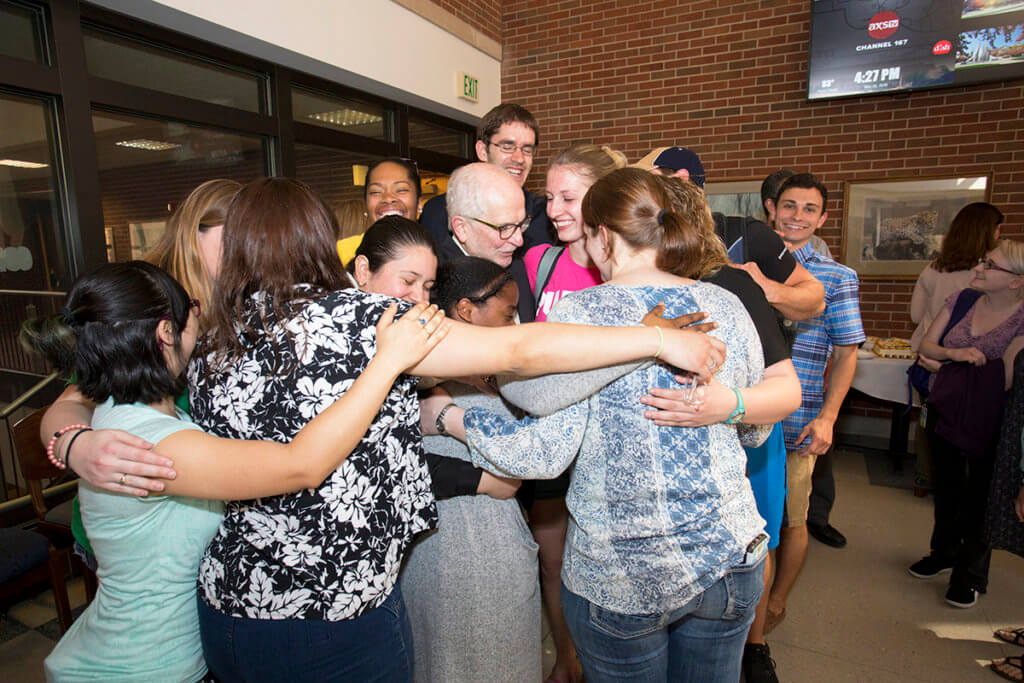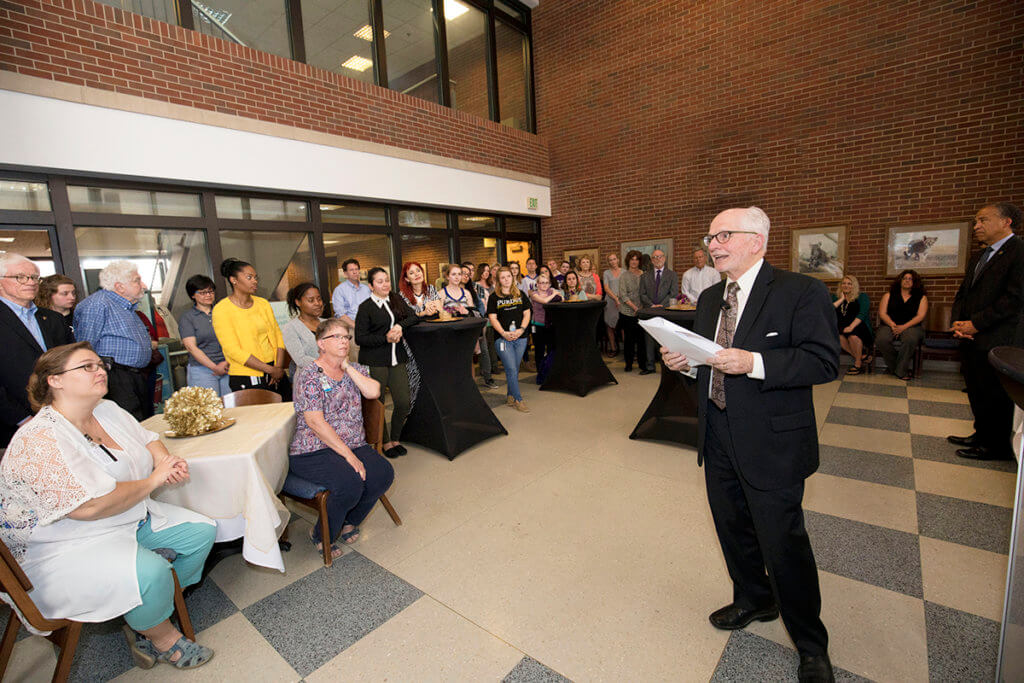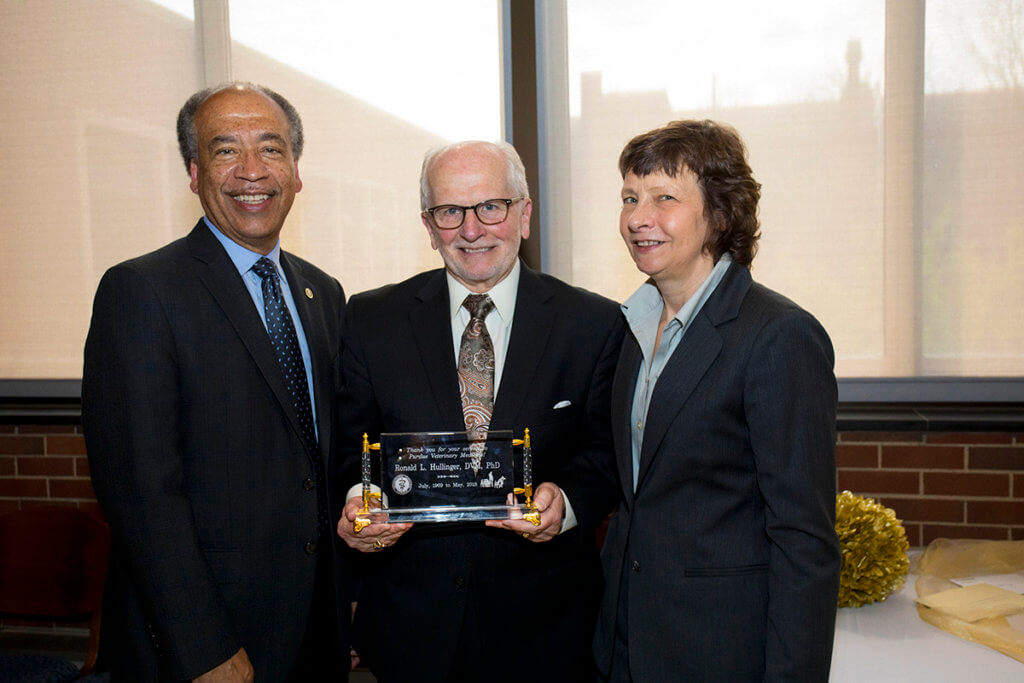
A crowd of Purdue Veterinary Medicine faculty, staff, and students gathered to recognize Dr. Ronald Hullinger at a reception held in honor of his retirement last month as professor of basic medical sciences. Dr. Hullinger came to Purdue University in 1969, just a few years after the College of Veterinary Medicine graduated its first class of veterinarians in 1963. He retired as of May 15, completing nearly 50 years of service to the College.

Dr. Hullinger expresses appreciation and shares words of advice during the reception held in honor of his retirement in the Continuum Café. The advice he shared included encouragement to do such things as reading books; visiting a museum every six months; visiting a playground often and listening and laughing; visiting parks often; habitually smiling and saying “hello”; being grateful and acting like it; and giving regularly.
Dr. Hullinger earned his DVM degree in 1965 at the Iowa State University College of Veterinary Medicine, where he went on to complete his PhD in 1968, at which time he joined the faculty there. A year later he accepted an appointment at Purdue University as assistant professor of veterinary anatomy in what was then the Department of Veterinary Anatomy, which later became part of the Department of Basic Medical Sciences. Rising through the academic ranks, Dr. Hullinger was promoted to full professor in 1985. He also served as director of Veterinary Medical Education from 1988 to 1994.
Noting the size of the crowd that gathered for the reception in the Continuum Café on May 2, Dean Reed commented, “This is a testament to you and the appreciation that we all have for you.” Then he asked a rhetorical question. “How do you thank someone who has given almost 50 years of service to our college and to Purdue University? That’s a hard thing to do,” Dean Reed said. “Think about all those years — all the contributions he’s made, the hours he spent doing research, preparing lectures, delivering those lectures, meeting with students, attending committee meetings, and attending conferences. All of those are contributions to the success of our college.”

Dean Willie Reed and Basic Medical Sciences Department Head Laure Jaeger congratulate Dr. Ron Hullinger, who holds an engraved glass plaque given in recognition of his retirement.
Dean Reed also recalled his own experience coming to Purdue in 1978 as a graduate student. He said while he knew Dr. Hullinger during that time, he has been able to get to know him much better since becoming dean 11 years ago. “I’ve always admired him for what he has done,” Dean Reed said. “I think if you go to the dictionary and you turn to the word ‘professor’ — if there was a picture of a professor, he looks the part right? He looks like a distinguished professor and always presents that image and always is someone we can all look up to.”
Dr. Laurie Jaeger (PU DVM ’84; PhD ’91), head of the Department of Basic Medical Sciences, spoke at the beginning of the reception, remembering when she first met Dr. Hullinger, not as a colleague, but when she was a first-year veterinary student back in 1980. “He welcomed me into this college and here I am sort of bidding adieu, isn’t that amazing?” Dr. Jaeger said Dr. Hullinger made many contributions to his field, including chapters in definitive anatomical and histological textbooks. She noted he also took opportunities to do sabbaticals and made international connections with faculty in other parts of the world that also benefitted the teaching at Purdue. “But if you know Dr. Hullinger at all, even with all those accomplishments, you’ll recognize that the interactions that have really driven him, and what he’s been passionate about, have been his interactions with the veterinary students,” Dr. Jaeger said.
Dean Reed estimated that of the approximately 3,400 veterinarians who have graduated from Purdue, Dr. Hullinger probably touched 90 percent of those students in some fashion, either teaching or providing mentorship, counseling, or just friendship. “That is quite a record. That is quite a legacy,” Dean Reed said. He also noted that, most recently, Dr. Hullinger played a huge role on the College’s Diversity Action Committee. “He has worked tirelessly with committee members and myself and others to make sure that we have a welcoming and inclusive culture here in our college.”
Both Dr. Jaeger and Dean Reed wished Dr. Hullinger the best in his retirement. “As you move into retirement, may every day be filled with a zest for life and may every day be filled with new dreams,” Dean Reed said.
Dean Reed then shared a letter from Purdue Provost Jay Akridge announcing the approval of Dr. Hullinger’s designation as Professor Emeritus of Basic Medical Sciences. He also presented Dr. Hullinger with a glass plaque featuring an engraving of the Continuum sculpture and the College’s seal. Dr. Hullinger then expressed his appreciation for all of the opportunities he has had to interact with faculty, staff, and students. “It’s just amazing what you have given to me,” Dr. Hullinger said. “Thank you all.”
